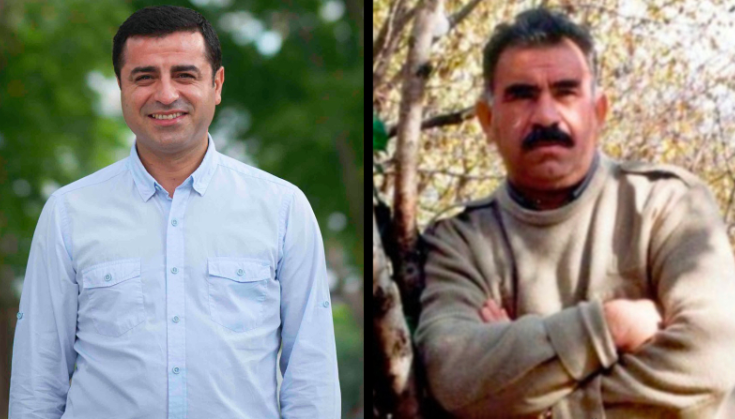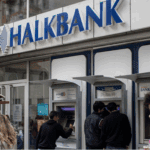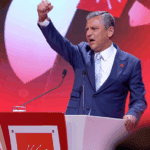On October 7, in a last-minute move, the Turkish government submitted an appeal to the European Court of Human Rights (ECtHR) challenging a recent ruling that the continued imprisonment of Kurdish politician Selahattin Demirtaş is unlawful Ankara waited until the final day of the deadline to lodge its objection, a decision that delays compliance with the ECtHR’s call to free Demirtaş after nearly nine years behind bars. This eleventh-hour appeal comes despite mounting international pressure and repeated European court decisions condemning Demirtaş’s detention as politically motivated. It also comes at a moment of deep soul-searching in Turkey about how to resolve the Kurdish issue. Ironically, the insistence on keeping Demirtaş locked up may have less to do with Ankara’s own strategic interests and more to do with the wishes of another imprisoned figure: Abdullah Öcalan, the founder of the outlawed Kurdistan Workers’ Party (PKK). As Turkey gropes for a lasting peace, it must recognize that its future security and unity are better served by embracing democratic and popular leaders like Demirtaş rather than deferring to the grudges of an aging insurgent leader.
Öcalan’s Rivalry with Demirtaş: The Unspoken Motive
It is increasingly evident that the strongest desire to see Demirtaş remain in prison comes not from Turkey’s courts or government, but from İmralı Island – the prison holding PKK leader Abdullah Öcalan. Öcalan has long viewed Selahattin Demirtaş as a rival within the Kurdish political movement and has openly criticized him in ways that mirror this rivalry. In newly revealed comments from prison, Öcalan blasted Demirtaş’s famous 2015 slogan “Seni başkan yaptırmayacağız” (“We will not let you become president”) – a pointed jab at President Erdoğan – calling it a “mistake” and a strategic error. He argued there was no need to confront Erdoğan so directly and chided Demirtaş for narrowing the Kurdish movement’s political strategy with such a combative stance. This rare rebuke from Öcalan lays bare his resentment of Demirtaş’s approach and hints at personal animosity: Demirtaş’s bold, democratic challenge to Erdoğan’s power in 2015 not only infuriated the Turkish president, it also irked Öcalan, who evidently saw it as a move made without [Öcalan’s] approval and contrary to his strategic line.
Indeed, President Erdoğan himself once remarked on “a power struggle between Demirtaş and Öcalan”, even suggesting that Öcalan felt “betrayed” by Demirtaş’s independent political maneuvers. In June 2019, on the eve of Istanbul’s pivotal mayoral rerun election, Erdoğan noted Öcalan’s displeasure that Demirtaş and the pro-Kurdish HDP were supporting the opposition candidate against the ruling party. Öcalan had, through a state-broadcast letter, urged the HDP to remain “neutral” in that election – widely seen as an attempt to undercut Demirtaş’s strategy of aligning with Turkey’s broader opposition. As Erdoğan described it, Öcalan believed Demirtaş “betrayed him,” and “because of this betrayal, [Öcalan] has a certain attitude towards them” – “them” meaning Demirtaş and the HDP. These words underscore that Öcalan harbors a deep grudge: he perceives Demirtaş’s rise as a challenge to his own primacy over the Kurdish cause.
The rivalry goes even further. During recent contacts with Kurdish political delegations, Öcalan has reportedly refused to even utter Demirtaş’s name. Prominent Turkish columnist Fatih Altaylı relayed an intriguing detail: in meetings with the new pro-Kurdish Democracy Party (the HDP’s successor), neither Öcalan nor the party representatives mentioned Demirtaş at all. The omission was deliberate and telling. By pointedly ignoring Demirtaş, Öcalan signaled that he does not recognize the jailed HDP leader’s legitimacy. It is as if, in Öcalan’s view, only one individual is important to the Kurdish movement – Abdullah Öcalan – and no one else should get ideas above their station. Demirtaş’s very popularity and democratic credibility are seen as threats to Öcalan’s long uncontested role as the Kurds’ singular leader. Thus, keeping Demirtaş sidelined in prison conveniently eliminates a competing voice.
In short, the continued imprisonment of Selahattin Demirtaş aligns neatly with Öcalan’s personal interests. Öcalan has never publicly called for Demirtaş’s release, and all indications are that he prefers this charismatic rival remain behind bars. Ankara, by doggedly resisting Demirtaş’s freedom in defiance of ECtHR rulings, is unwittingly doing Öcalan’s bidding. This reality should give pause to Turkish officials: whose agenda is really served by Demirtaş’s prolonged incarceration? Every additional day that Demirtaş languishes in Edirne Prison is a day that Öcalan’s dominance over the Kurdish narrative goes unchallenged. Turkey must ask itself whether it makes sense to hand Öcalan that victory.
Democratic Legitimacy vs. Militant Legacy: Who Speaks for the Kurds?
Despite Öcalan’s lingering influence over die-hard PKK militants, it is Selahattin Demirtaş who holds far greater sway among ordinary Kurdish citizens and across wider Turkish society. The contrast between the two men’s influence was starkly illustrated during the 2019 Istanbul mayoral election. Öcalan, after years of isolation, was permitted by authorities to send out a surprise message: he called on Kurdish voters and the HDP to stay neutral in the Istanbul vote The Turkish government’s motive in publicizing Öcalan’s letter was transparent – President Erdoğan hoped that Öcalan’s weight might keep Kurdish voters at home, thereby helping his party’s candidate. But that gambit failed. Demirtaş, from his prison cell, had already issued his own call via tweets and letters, urging Kurds to “vote for Ekrem İmamoğlu,” the opposition candidate. The HDP’s base heeded Demirtaş, not Öcalan. Kurdish turnout in Istanbul was robust and overwhelmingly in favor of the opposition. İmamoğlu decisively won the rerun election – a victory credited in no small part to Demirtaş’s appeal galvanizing Kurdish voters.
This episode spoke volumes. At the time, Erdoğan openly acknowledged a “serious power struggle” between Öcalan and Demirtaş for the hearts and minds of Kurdish voters. And tellingly, when forced to choose, the Kurds of Istanbul followed the democratic politician who represents their voice in Parliament, not the jailed guerrilla leader on an island. The Kurdish public has tasted the power of the ballot box through Demirtaş and his party, and they are reluctant to give that up. While Öcalan’s words still command respect in certain quarters, he cannot deliver votes or democratic legitimacy; Demirtaş can.
Consider Demirtaş’s record: he has consistently translated Kurdish aspirations into political action rather than violence. As co-chair of the HDP, he led the party to an historic breakthrough in the June 2015 elections, winning 13% of the national vote and 80 seats in Parliament – a first for a pro-Kurdish party. Demirtaş himself has twice run for president of Turkey. In 2014, he electrified the country with nearly 9.8% of the vote nationally, introducing a pluralist, inclusive vision that drew support well beyond the Kurdish southeast. Even from prison in 2018, unable to campaign in person, he still secured over 8% of the presidential vote. These figures represent millions of Turkish citizens – Kurds, yes, but also liberal Turks, youths, women, and minorities – who see Demirtaş as their voice for change. He has earned a mandate at the ballot box that Öcalan never had and never will. Where Öcalan’s name is synonymous with an armed insurgency that most Turks (and many Kurds) recoil from, Demirtaş has come to symbolize the possibility of Kurdish inclusion in democratic life. His influence comes not from coercion or personality cult, but from electoral legitimacy and a message of hope that resonates across ethnic lines.
Even within the Kurdish movement, Demirtaş’s standing confers a type of influence Öcalan lacks: the ability to deliver public consent. During peace negotiations or political initiatives, having Demirtaş on board means having the buy-in of a broad constituency of Kurdish civilians. By contrast, Öcalan’s remaining influence is mostly over the armed cadres of the PKK – a crucial but narrow segment. This distinction is critical. Lasting peace in Turkey’s Kurdish question will require the Kurdish public’s wholehearted support for any settlement. Demirtaş, with his proven popular appeal and democratic credibility, is far better suited to rally that support than a man associated in the public eye with decades of bloodshed. In the battle for the Kurdish future, the democratic politician plainly outshines the militant commander. Ankara ignores this reality at its peril.
National Security Through Inclusion, Not Exclusion
Turkey’s national security, stability, and territorial integrity would be better safeguarded by engaging Demirtaş – who represents a new, democratic future for the Kurds – rather than privileging Öcalan’s outdated, factional influence. The Turkish state has often treated the Kurdish issue purely as a security problem, relying on military force or secret deals with insurgent leaders. But after 40 years of conflict, a consensus is growing that peaceful resolution of the Kurdish problem is a precondition for democracy in Turkey. In other words, lasting stability will not come from striking bargains with one insurgent faction or another; it will come from incorporating an entire population into the nation’s political compact on the basis of equality and justice. No one embodies that path forward better than Selahattin Demirtaş.
By contrast, what does privileging Öcalan’s role over Demirtaş’s achieve? Any deal made solely with Öcalan, while Demirtaş and other elected Kurdish leaders rot in prison, would be inherently lopsided and brittle. It might bring the end of the PKK, but it would not address the grievances of Kurdish citizens or strengthen their faith in Turkey’s democracy. In fact, the optics of Ankara courting Öcalan – a convicted terrorist leader – while imprisoning moderate politicians like Demirtaş sends a perverse message. It signals that taking up arms yields more results than taking up ballots, and that Ankara prefers an aging insurgent leader who can be bargained with behind closed doors over a younger generation of Kurds who believe in open, democratic competition. Such a message is as dangerous as it is absurd.
Recent developments illustrate this danger. In late 2024, Turkey’s ruling coalition (led by President Erdoğan’s AKP and the nationalist MHP) launched a new “peace process” by reaching out to Öcalan. Devlet Bahçeli, the MHP’s firebrand leader, even invited Öcalan to weigh in on disarmament, and Öcalan responded in early 2025 with a dramatic call for the PKK to lay down arms and dissolve itself. On one level, Öcalan’s willingness to end the armed struggle is welcome. But the process so far has conspicuously excluded representatives like Demirtaş and other HDP (now DEM Party) figures who stand for Kurdish rights through peaceful politics. The fact that well-known Kurdish politicians such as Demirtaş and Yüksekdağ are being held in prison at a time when the government conducts peace talks with the PKK raises suspicions about the government’s motives. There are growing fears that Ankara’s outreach to Öcalan is more political theater than genuine reconciliation – a bid to claim credit for “peace” while avoiding the harder task of democratic reform. In other words, a deal with Öcalan alone could become a fig leaf to avoid engaging with Kurdish society at large.
Strategically, this would be a grave mistake. Öcalan’s influence is pragmatic – confined to the PKK fighters who still revere him – and he has shown he will negotiate on Erdoğan’s terms, ignoring autocratic excesses and human rights violations so long as his own status is recognized. Demirtaş’s influence, on the other hand, is democratic. He commands no armed units; what he offers is the power to legitimize a peace deal in the eyes of millions of Kurdish citizens. He can do so because he is respected as an advocate of pluralism and justice – values essential to Turkey’s unity. Engaging Demirtaş would show Turkey’s Kurds that the state values their votes and voices, not just their silence. It would undercut the militants’ narrative by proving change is possible through politics. And it would rob the PKK of its biggest recruitment tool – the perception that Turkey will jail even the most peaceful Kurdish leaders, leaving violence as the only recourse.
Demirtaş himself has consistently urged a path of peaceful coexistence built on democracy. In a recent letter from prison, he called for a “new paradigm” in Turkish-Kurdish relations founded on “equal citizenship” and true reconciliation: “Do not be afraid! Bring peace,” he implored, endorsing dialogue over conflict. He has supported Öcalan’s ceasefire call, but with the crucial addition that any peace must be transparent and involve society at large. Demirtaş’s vision aligns Turkey’s territorial integrity with full democratic inclusion of Kurds, whereas Öcalan’s influence, by its nature, centers on a narrow militant agenda.
In weighing these two, Ankara should think strategically. Siding with an imprisoned 75-year-old insurgent who bristles at sharing the stage with elected Kurdish politicians is a recipe for a fragile, top-down “peace” that could collapse with the slightest provocation. Embracing Demirtaş, conversely, means empowering those who can sell peace from the bottom up – community leaders, activists, and politicians who have stakes in Turkey’s democratic future. It means privileging ballots over bullets, legitimacy over expediency. Turkey stands at a crossroads: continue suppressing the Demirtaşes in pursuit of a false peace, or release them and actually build a real one.
Free Demirtaş – Invest in Peace and National Strength
As Turkey submits its appeal against the ECtHR ruling and doubles down on Demirtaş’s imprisonment, it is worth asking what this obstinance achieves. Prolonging Demirtaş’s detention not only flouts the rule of law and Turkey’s international obligations – it actively undermines the country’s long-term security and unity. The Council of Europe’s Committee of Ministers has bluntly warned that keeping Demirtaş locked up is seen as a move “to suppress political pluralism and curtail democratic debate” in Turkey. Every day Ankara resists the ECtHR judgment is a day it signals fear of its own democracy. In contrast, complying with the court’s ruling would bolster Turkey’s credibility and begin to repair trust with its Kurdish population. Releasing Selahattin Demirtaş unconditionally, as Europe’s top human rights court and Turkey’s own constitutional commitments demand, is not a concession to terrorism – it is an affirmation of Turkey’s faith in its democratic process. It would show that Ankara has the confidence to defeat ideas at the ballot box rather than by jailing opponents.
Most importantly, freeing Demirtaş would remove a major thorn from Turkey’s domestic politics and open the door to a more inclusive peace. It would deprive Abdullah Öcalan of the perverse satisfaction that his chief rival remains silenced. It would allow the “democratic future” that Demirtaş represents to take its rightful place at the negotiating table, alongside – or even ahead of – the militant past that Öcalan represents. In practical terms, Demirtaş’s freedom could energize new discussions on reforms, cultural rights, and local governance that address Kurdish aspirations within Turkey’s unity – the very issues that any durable peace process must tackle. The ruling coalition’s apparent reliance on Öcalan in 2019 prompted the question of whether Ankara was putting its hopes in Öcalan to win a political battle. Today, the question is even sharper: will Turkey bank its hopes on Öcalan’s grudges or on Demirtaş’s democratic promise and popular appeal?
For the sake of Turkey’s national strength, the answer should be clear. Prioritizing Demirtaş over Öcalan is not about choosing one Kurd over another – it is about choosing the path of democracy over the path of endless insurgency. It is about recognizing that a free Selahattin Demirtaş is far more valuable to Turkey’s future than a perpetually caged one. President Erdoğan’s government often speaks of making Turkey a regional leader and a stable, confident nation. That vision cannot be realized so long as Turkey is at war with its own democratically elected Kurdish leaders. By releasing Demirtaş and all political prisoners, Ankara would signal a commitment to political inclusion that undergirds true national unity. It would show strength, not weakness – the strength to make peace with its Kurdish citizens on just terms, rather than seek advantage through divide-and-rule tactics.
Turkey has a historic opportunity to turn a page. Complying with the ECtHR ruling and freeing Selahattin Demirtaş would be more than an act of legal compliance; it would be a bold leap towards a lasting peace and a stronger democracy. Ankara should seize this moment. Rather than fear Demirtaş’s popularity, embrace it as a force that can help finally end the conflict that has cost 40,000 lives and scarred generations. Rather than cling to the counsel of an isolated insurgent who cannot tolerate sharing the limelight, engage the Kurdish leaders who carry the mandate of the people.
Amid all the chatter about who might succeed Erdoğan, lead the CHP or MHP, or become a contender in the next presidential election, one crucial figure is conspicuously absent from the conversation: Selahattin Demirtaş. While analysts debate İmamoğlu’s chances or Erdoğan’s possible heir, they overlook the man whose vision and influence could redefine Turkey’s democratic future. Far more than a prisoner or a polarizing opposition voice, Demirtaş represents the only bridge between Turkey’s fragmented social blocs and its long-deferred promise of coexistence. Ignoring him means misreading the country’s most important political equation.
Free the future – free Demirtaş – and Turkey will be freeing itself as well. In choosing justice over vengeance, Turkey will affirm that its republic is robust enough to include all its citizens. In prioritizing Demirtaş over Öcalan, Turkey will be choosing the only realistic path to long-term peace, stability, and national strength. The time to make that choice is now. Let Turkey choose that future now, and not be held back by the jealousies of the past. It’s time to free the future.
By: News About Turkey (NAT)



